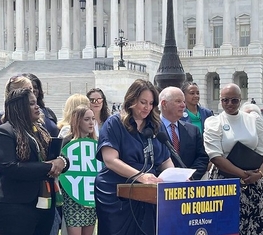Pennsylvania Senate Intergovernmental Operations Committee v. Pennsylvania Department of State
Case Summary
The Pennsylvania Senate Intergovernmental Operations Committee filed a lawsuit requesting enforcement of a subpoena demanding the release of records on all nine million registered voters in Pennsylvania. These records include information on voters' driver’s license numbers and the last four digits of their social security numbers. The Pennsylvania Department of State had refused to produce the records, arguing it would violate voters’ privacy rights and potentially federal law. The League of Women Voters of Pennsylvania intervened in the case to protect the privacy of its members and voters.
On September 15, 2021, the Pennsylvania Senate Intergovernmental Operations Committee (“Senate committee”), following a public hearing on proposed Pennsylvania election law amendments, issued a subpoena ordering Acting Pennsylvania Secretary of State, Veronica Degraffenreid, to produce seventeen categories of election-related documents. Among the requests were a list of all electors who voted in the November 2020 General Election and in the May 2021 Primary Election in person, by mail-in ballot, or by absentee ballot and information on all nine million registered Pennsylvania voters contained in the Statewide Uniform Registry of Electors (SURE) system, including voters’ names, addresses, dates of birth, and last four digits of their social security numbers.
In response, the Acting Secretary and the Attorney General of Pennsylvania filed a suit, known as Costa v. Corman, against the Senate Committee Chairman, seeking to prevent enforcement of the Senate committee’s September 15 subpoena. The Department of State refused to comply with the subpoena, arguing it violated state law and the state constitution.
The Senate committee then filed this lawsuit against the Pennsylvania Department of State and the Acting Secretary of the Commonwealth at the time, Leigh Chapman. The committee requested the court order the Department of State to turn over the information requested in the Senate Committee’s subpoena.
On April 22, 2022, the League of Women Voters of Pennsylvania (“LWVPA”) and other organizations filed applications to intervene. LWVPA argued its intervention was necessary to protect its members’ privacy.
On July 13, 2022, the court granted LWVPA’s request to join the lawsuit. Subsequently, both parties filed competing motions for summary judgment. On September 12, 2022, the court heard oral arguments.
On February 9, 2023, the court dismissed the lawsuit and ruled that the court did not have to intervene because the committee had its own mechanisms for enforcing subpoenas.
LWVPA was represented in this litigation by ACLU of Pennsylvania and Schnader, Harrison, Segal & Lewis, LLP.
LWV Timeline
Senate committee files petition to enforce subpoena
he Pennsylvania senate intergovernmental operations committee files a lawsuit, seeking a court order mandating the Secretary of the Commonwealth turn over the information requested in its subpoena.
LWV Pennsylvania and partners move to intervene
LWV Pennsylvania moves to intervene in the case to protect the privacy of its members and voters.
Senate committee requests an order granting summary relief and enforcing the subpoena
The committee requests the court order the Acting Secretary and the Department of State to fully comply with the subpoena issued on September 15, 2021. The committee argues it is entitled to inspect and examine any books, papers, records, or accounts filed with the Department of State or in the Acting Secretary's possession under Pennsylvania state law.
Pennsylvania Department of State and Acting Secretary file preliminary objections
The Department of State and Acting Secretary argue it is not legally settled whether the Acting Secretary must produce the requested materials and that the Acting Secretary has a duty under the state constitution to balance the informational privacy interests of registered voters against the public interest in disclosure.
LWV Pennsylvania files its opposition to summary relief
LWV Pennsylvania files a brief opposing the committee’s request for summary relief, arguing the subpoena had no factual justification and that Pennsylvania law protects the right of privacy, which includes protection of sensitive information like Social Security and driver’s license numbers from legislative requests for information.
Commonwealth court dismisses case
The commonwealth court dismisses the case, ruling it was not ripe for review, as the committee had not used its powers to compel compliance yet, meaning there was no confrontation between branches of government to adjudicate.





